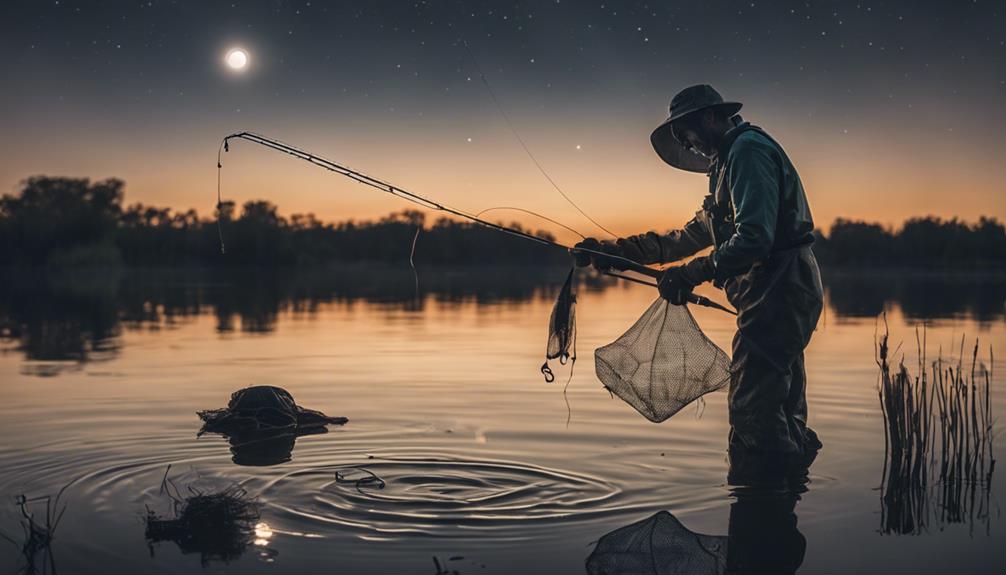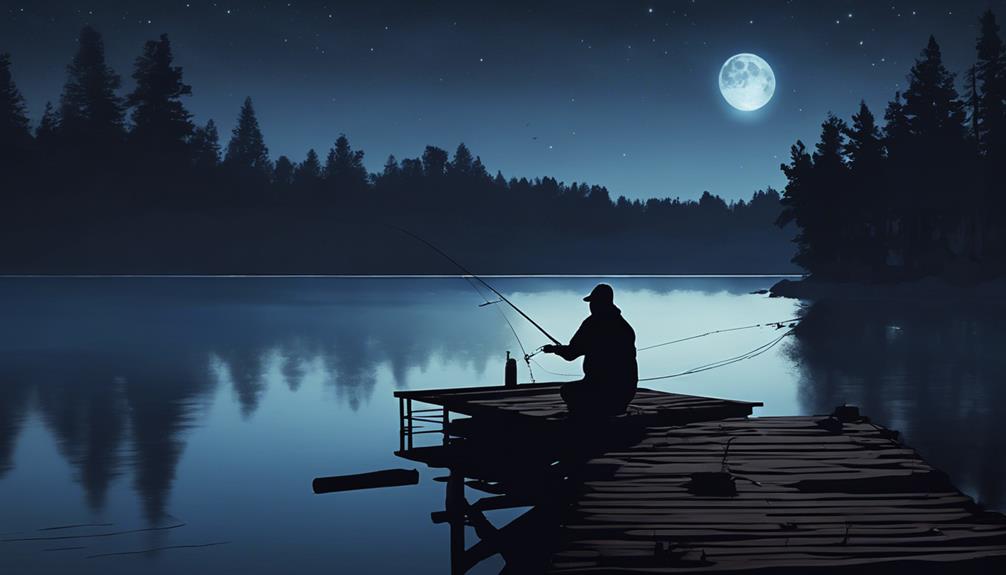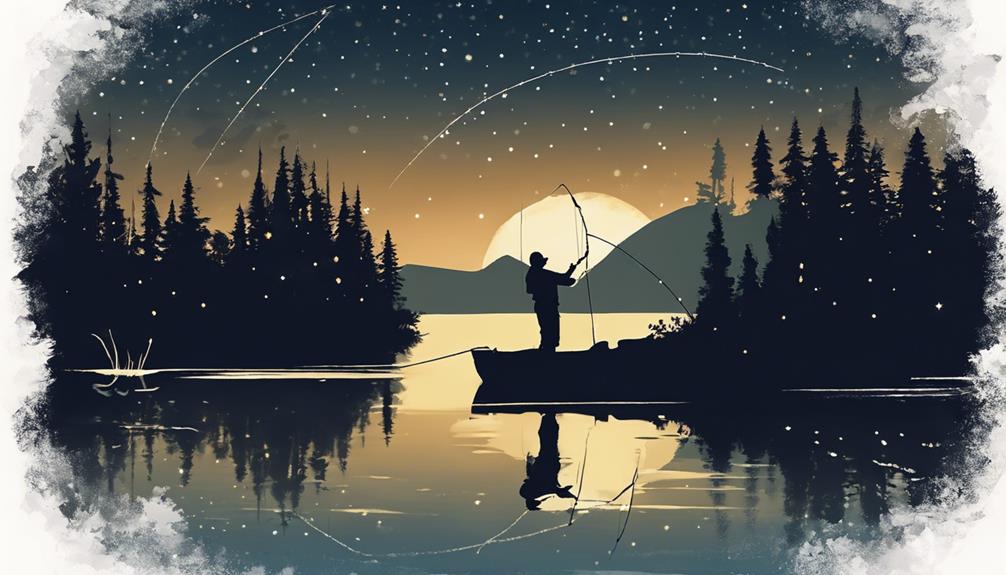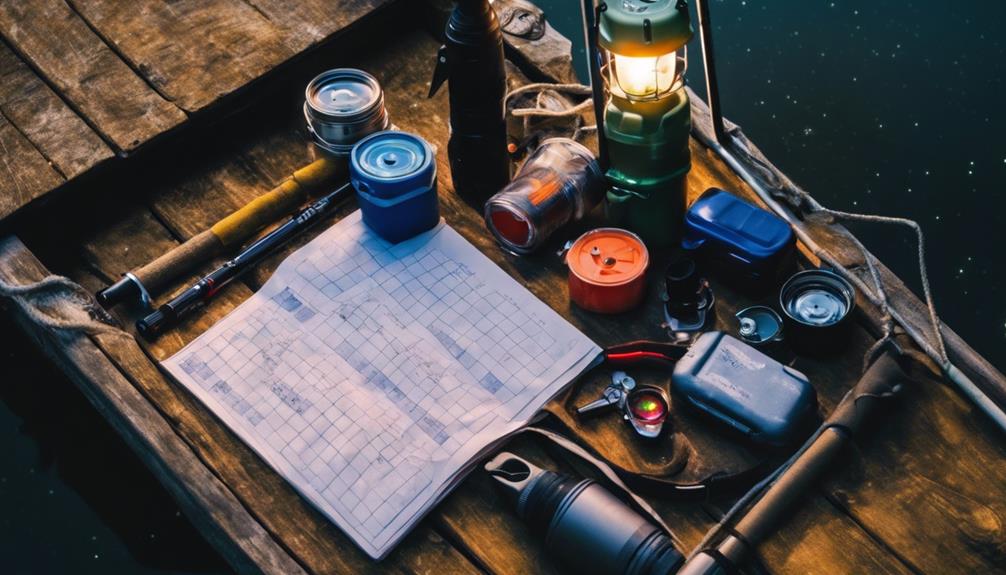To master safe night fishing, prioritize safety with proper planning and preparation. Maintain good night vision by using low-intensity red lights and carrying a reliable light source. Essential gear includes a personal flotation device, first aid kit, and night vision gear like headlamps. Proper lighting setup with white and green LED lights enhances visibility. Choose fishing locations wisely, familiarize yourself with potential hazards, and be weather-aware. Handle fish with care, reviving them properly for catch and release. Organize equipment for safety and efficiency. Stay prepared with emergency gear and communication protocols. Secure your fun and safety through these tips.
Importance of Night Fishing Safety
Ensuring your safety while night fishing is paramount to a successful and enjoyable angling experience. When the sun sets and darkness envelops the waters, being prepared with proper safety precautions becomes essential. One crucial aspect of night fishing safety is maintaining good night vision. Your eyes need time to adjust to the dark, so avoid using bright lights unnecessarily. Utilize low-intensity red lights when necessary, as they're less likely to disrupt your night vision compared to white lights.
Additionally, it's imperative to be aware of potential hazards that may not be as visible in the dark. Rocks, branches, or uneven terrain can pose risks, so always tread carefully. Furthermore, make sure to inform someone of your fishing location and expected return time. In case of an emergency, having someone aware of your whereabouts can be a lifesaver.
When venturing out for a night fishing escapade, always carry a reliable light source and a fully charged phone for emergencies. Be mindful of your surroundings and avoid isolated areas if possible. Remember, safety should always come first to guarantee a successful and memorable night fishing experience. By taking the necessary safety precautions and being vigilant, you can fish with confidence even in the dark of night.
Essential Safety Gear for Night Fishing
Carry essential safety gear to enhance your night fishing experience and ensure your well-being on the water. Safety equipment is crucial for a successful and secure night fishing trip. First and foremost, a reliable personal flotation device (PFD) is a must. Even if you're a strong swimmer, unexpected accidents can happen. A PFD will keep you safe in case you fall overboard. Additionally, having a fully stocked first aid kit on board is essential. Accidents can occur, and having the necessary supplies readily available can make a significant difference in emergencies.
When night fishing, your vision is limited, making night vision gear indispensable. Invest in a good quality headlamp or flashlight with a red light mode to maintain your night vision capabilities. Red light doesn't disrupt your eyes' adaptation to the dark, allowing you to see clearly without losing your night vision. Moreover, consider bringing along a spotlight or floodlight to illuminate the area around your boat for increased safety and visibility. These lighting tools not only help you navigate but also make you more visible to other boaters, reducing the risk of collisions.
Setting Up Proper Lighting
To create a safe and well-illuminated environment for your night fishing expedition, strategically positioning bright and focused lights around your boat is essential. Proper illumination is crucial for maintaining visibility on the water during nighttime hours. Start by installing a combination of white and green LED lights on both the interior and exterior of your boat. White lights are excellent for general visibility, while green lights attract baitfish, thus drawing in larger game fish.
When setting up your lighting, consider using a mix of floodlights and spotlights to cover different areas effectively. Floodlights provide broad illumination, ensuring a well-lit surrounding, while spotlights can be directed towards specific areas such as the fishing spot or anchor. Mounting lights at varying heights can also help eliminate shadows and provide a more uniform lighting setup.
Utilize techniques such as angling the lights downwards to reduce glare off the water and prevent obstructing your night vision. Additionally, using red filters on some lights can help preserve your night vision while still providing ample illumination. Remember to check local regulations regarding the use of lights while fishing at night to ensure compliance and safety.
Location Selection for Safe Night Fishing
For a successful night fishing adventure, pinpointing the right location is key to optimizing your chances of a fruitful catch. When selecting the ideal spots for night fishing, consider areas with structure like submerged rocks, fallen trees, or underwater vegetation. These spots attract baitfish and provide cover for larger game fish seeking an easy meal under the cloak of darkness.
Navigation plays a crucial role in ensuring you reach your chosen spot safely. Before heading out, familiarize yourself with the water body during daylight hours, noting any potential hazards like shallow areas or submerged obstacles. Use GPS or markers to guide your way back to the shore, especially in areas where visibility is limited at night.
While night fishing can be exhilarating, it's essential to be aware of potential wildlife encounters. Take precautions by carrying a bright flashlight to scan your surroundings periodically. Be cautious of wildlife like snakes or nocturnal animals that may be more active during the night. Avoid shining lights directly into the water to prevent attracting unwanted attention from predators.
Weather Considerations and Safety
When planning your night fishing expedition, it's crucial to carefully consider weather conditions and prioritize safety above all else. The success of your fishing trip and your well-being depend greatly on being prepared for any weather-related challenges that may arise. Here are some key points to keep in mind:
- Weather conditions: Pay close attention to the weather forecast before heading out. Be aware of any changes in wind speed, precipitation, or temperature that could impact your fishing experience. Low visibility due to fog or heavy rain can make navigation difficult, so always have a plan for these scenarios.
- Visibility: Limited visibility at night can pose a significant safety risk. Make sure your boat is equipped with proper lighting, including navigation lights and a spotlight for emergencies. Reflective tape on oars or paddles can also help others see you in the dark.
- Safety precautions: Prioritize safety by wearing a life jacket at all times and ensuring everyone on board does the same. Have a first aid kit readily available and familiarize yourself with basic navigation techniques in case visibility is reduced.
Personal Safety Measures for Anglers
Considering the potential risks associated with night fishing, ensuring personal safety measures as an angler is paramount for a successful and secure fishing experience. When venturing out for a night fishing expedition, it's crucial to be prepared with self-defense techniques. Carrying a whistle or personal alarm can help ward off any potential threats by alerting others in the vicinity to your location in case of an emergency. Additionally, taking a self-defense class can provide you with the skills and confidence needed to protect yourself in unexpected situations.
Communication devices are essential tools to have on hand while night fishing to ensure your safety. Carrying a fully charged mobile phone or a two-way radio is advisable to stay connected with others or seek help if needed. In case of an emergency, being able to communicate with emergency services or fellow anglers can make a significant difference in swiftly resolving any dangerous situations that may arise.
Prioritizing personal safety measures such as self-defense techniques and communication devices can significantly enhance your security and peace of mind during night fishing trips. By being proactive and prepared, you can focus on enjoying your fishing adventure while knowing that you have taken the necessary precautions to safeguard yourself against potential risks.
Handling Fish and Equipment Safely

Prioritize the safe handling of fish and equipment to ensure a smooth and successful night fishing experience. When it comes to handling fish and equipment safely, attention to detail is key. Here's how you can make sure you're doing it right:
- Fish handling, release: When you catch a fish, make sure to handle it with care. Wet your hands before touching the fish to protect its outer layer. Avoid squeezing the fish too hard, especially around the gills, as this can harm them. If you're practicing catch and release, ensure the fish is properly revived before letting it swim away. Hold the fish in the water gently and move it back and forth to help oxygen flow through its gills.
- Equipment storage, organization: Keep your fishing equipment organized to avoid accidents and make your night fishing more efficient. Stow away sharp objects like hooks safely to prevent injuries. Use tackle boxes or bags with compartments to store your gear neatly. Make sure your fishing rod holders are secure and won't tip over easily, especially during the excitement of reeling in a big catch. Properly organizing your equipment will save you time and hassle in the long run.
Emergency Preparedness for Night Fishing
Ensure you have a fully stocked and easily accessible emergency kit before embarking on a night fishing trip. Your emergency kit should include essential items such as a first aid kit, flashlight with extra batteries, a whistle, waterproof matches, a multi-tool, emergency blankets, and a fully charged cell phone with a portable charger. These items are crucial for any emergency response that may be needed during your night fishing expedition.
When night fishing, it's vital to establish communication protocols with someone on land. Make sure to inform them about your fishing location, expected return time, and what to do in case they don't hear from you by a certain hour. This step is essential for your safety, as it ensures that someone knows where you're and can act promptly if needed.
In addition to your emergency kit and communication protocols, familiarize yourself with basic first aid procedures. Knowing how to handle common fishing-related injuries such as hook punctures, cuts, or falls can make a significant difference in an emergency situation. Consider taking a first aid course specific to outdoor activities to enhance your emergency preparedness skills.
Frequently Asked Questions
Are Glow Sticks or LED Light Sticks Better for Night Fishing?
When considering fishing visibility at night, you may wonder if glow sticks or LED light sticks are better.
In a gear comparison, LED light sticks tend to provide more consistent and brighter illumination, making them a popular choice among night anglers.
They're durable, long-lasting, and often come in various colors to attract different fish species.
LED light sticks can enhance your night fishing experience by improving visibility and helping you track your line effortlessly.
How Can I Protect Myself From Insects While Night Fishing?
To shield yourself from insects while night fishing, you can apply bug repellent strategies like using insect repellent sprays or creams. Additionally, opt for clothing protection measures such as wearing long sleeves, pants, and hats to keep bugs at bay.
These precautions will help you enjoy your night fishing experience without being bothered by pesky insects.
Is It Safe to Fish Alone at Night?
Fishing alone at night can be safe if you take the necessary precautions. Solo safety is crucial, so inform someone of your location and expected return time.
Ensure night visibility by using a reliable light source and wearing reflective gear. Stay aware of your surroundings and be prepared for unexpected situations.
What Should I Do if I Encounter Wildlife While Night Fishing?
If you encounter wildlife while night fishing, remain calm and back away slowly. Avoid sudden movements and loud noises. Keep a safe distance and don't attempt to feed or approach the animals.
Always carry a flashlight and make noise while walking to alert wildlife of your presence. Be aware of your surroundings and follow basic safety precautions to minimize potential risks during your night fishing adventures.
How Can I Stay Alert and Avoid Fatigue During Night Fishing Trips?
To stay alert and avoid fatigue during night fishing trips, remember to pack energy drinks and snacks for quick boosts. Consider taking power naps to recharge, and bring along caffeine for a pick-me-up.
Stay hydrated and eat light, frequent meals to maintain energy levels. Engage in light stretching or short walks to stay active.
Conclusion
In conclusion, mastering safe night fishing requires careful planning, proper gear, and knowledge of safety measures. By following the tips and techniques outlined in this article, anglers can enjoy their night fishing adventures with confidence and peace of mind.
Remember to always prioritize safety, stay alert, and be prepared for any unforeseen circumstances. With the right precautions in place, night fishing can be a rewarding and enjoyable experience for all.



